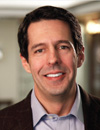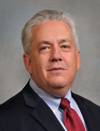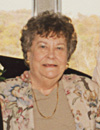
Lynn Britton MERCY HEALTH SYSTEM, ST. LOUIS
After 13 years in Missouri, transplanted Texan Lynn Britton had developed a high regard for people here. But not as high as the CEO of Mercy Health System would come to think of them on the morning of May 23, 2011, hours after the Joplin tornado. “Through every neighborhood and business district,” he recalls, “homeowners were trying to salvage what they could clean or repair,” not waiting for federal, local or state officials to react.
“A year ago, I would probably talk about the work ethic, strong family values, and the Middle America role model Missouri was for rest of the country. But after being in Joplin, I have a whole different perspective.” It was, he said, a demonstration of “incredible resolve in the face of amazing challenges.”
Including his own. Joplin’s largest hospital, St. John’s Mercy, couldn’t be saved. Britton’s staff had swung into action the night of the storm, reviewing lessons learned from other natural disasters. It was immediately clear that one of Joplin’s largest employers just couldn’t fold up.
“A medical community needs to have not just a sense of a future job, but has to keep working to keep those skills sharp,” Britton says. “You can’t be a doctor and sit on sidelines, then come back to being a doctor.” And without the hospital, the town’s health-care providers would be looking for work elsewhere, making recovery impossible.
Mercy Health quickly announced that all St. John’s employees would remain on salary through the recovery.
“I had never felt the weight of leader-ship like that on my shoulders before,” says Britton, 51, who lives in St. Louis with his wife, Thriess. “We had to find a way to get 2,200 people busy, creating an environment for them to work in.”

Tony Reinhart FORD MOTOR CO., CLAYCOMO
As recently as 2007, Missouri trailed only Michigan in numbers of light trucks manufactured in the United States. A big reason for that is the Ford Escape, long a staple of production at Ford Motor Co.’s Claycomo plant. Celebrating its 100th anniversary of building in Kansas City this year, Ford is sinking $1.1 billion into an overhaul at Claycomo, thanks in part to company executives who worked with Gov. Jay Nixon’s team to secure $100 million in state incentives in 2010. Among those was Tony Reinhart, Ford’s regional director of government and community relations. A native of Kansas City who grew up in nearby Lexington, he joined Ford in the mid-1990s after working at various posts in Jefferson City. Kansas City, he said, “has been very good to and for us and has served as an important partner as we have made decisions about where to invest.” Those decisions rely in part on the quality of the Missouri work force, Reinhart says, citing its dedication, skill and loyalty, along with strong union leadership. “Ford’s definition of competitive goes beyond cost competitiveness,” Reinhart says, focusing on ways to efficiently produce high-quality products that surprise and delight customers.
His own personal Ford favorite? “It would have to be the Ford Mustang,” Reinhart says. “A classic vehicle that has endured as the premier American muscle car.” Color? “Definitely a red convertible,” Reinhart says.

Betty Bruns MUMBRAUER GASTHAUS, HERMANN
Can a city have its own social director? Maybe, if that city is Hermann, Mo., and the person in that role is Betty Bruns. Her maiden name of Johnson is heavily stamped on the history of this wine country hamlet and neighboring Fredericksburg, where her son Steve and daughter-in-law Linda operate two of the finest restaurants in the region: Simon’s on the Waterfront (a blues bar) on the shore of the Missouri River, and the River’s Edge on the shore of the Gasconade River (take the Roy J. ferry—named after Betty’s brother, Roy Johnson—across the Gasconade).
Betty runs Hermann’s Mumbrauer Gasthaus, not far from the Missouri River and a block off Highway 100. There, she has welcomed thousands of visitors over more than three decades. Among many other affiliations, Bruns serves on the board of directors of the Hermann Hospital and is much of the reason that the hospital continues to expand its facilities and serve the area’s growing needs. Some smaller towns fade away with time, but make no mistake: Betty Bruns is among an elite few who have preserved and helped Hermann grow into one of Missouri’s most charming historic towns and tourism destinations. If your travels take you to Hermann and Missouri Wine Country, swing by the Mumbrauer Gasthaus at 223 E. Second Street and introduce yourself to Betty Bruns.

Bob Thompson BRYAN CAVE, KANSAS CITY
“There is nothing better,” says Robert Thompson, “than a Mizzou football Saturday, or being in my duck blind with some friends, or fall harvest at the farm.”
That gives you a sense of just how “Missouri” Thompson is. The managing partner in the Kansas City office of the Bryan Cave law firm exhibits traits found in many who live in the state. “Even if they didn’t grow up that way, most Missourians are only one or two generations removed from small towns or farms—I have that in common and run into that with people all across the state,” he says. He is still connected to the land. He also manages the family farmstead near Nevada, turning out soybeans and raising cattle. “It’s an important part of my family heritage, and has been for more than 100 years,” he says. “Our second home is there, and we spend many weekends a year there. I like to keep in touch with my roots and enjoy the challenges of farming. It’s a very rewarding endeavor.” That longstanding connection to farming—an inherently risky way to make a living—shows up in other ways, he says. “People here are friendly and open, and resilient—there’s a certain amount of stoicism in Missouri about facing adversity and the challenges of life. Look at what the citizens of Joplin did: There was not a lot of complaining; it’s just pick up my shovel, axe or chainsaw and go to work. ‘It’s the hand we got dealt; let’s get to work,’” he says.